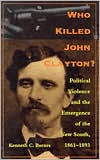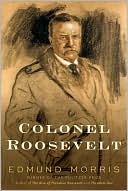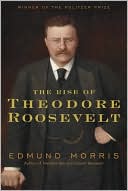Who Killed John Clayton?: Political Violence and the Emergence of the New South, 1861-1893
In 1888 a group of armed and masked Democrats stole a ballot box from a small town in Conway County, Arkansas. The box contained most of the county’s black Republican votes, thereby assuring defeat for candidate John Clayton in a close race for the U.S. Congress. Days after he announced he would contest the election, a volley of buckshot ripped through Clayton’s hotel window, killing him instantly. Thus began a yet-to-be-solved, century-old mystery.\ More than a description of this particular...
Search in google:
A narrative history of vote-rigging and lynching, the murder of a congressional candidate, and other crimes committed by white Democrats in Arkansas at the end of the last century. Arkansas Historical Quarterly This superb book is a model of what local history can and ought to be....[It] is essential reading for all those interested in the history of Arkansas and the South. It not only reveals who killed Clayton and why but also explains the consequences of this premeditated act and reveals much about the role of violence in the nation's political process.
List of IllustrationsPrefaceAcknowledgmentsIntroduction11Local Divisions and Lasting Grudges: Civil War and Reconstruction72Motives for Murder: Democrats and Republicans Compete for Power, 1872-1888333Murder and Fraud: How Democrats Reclaimed Conway County, 1888-1889604Consequences of Murder: Things Fall Apart, 1890-1893945Murder's Reward: Rule of the Fine-Haired Gentlemen117Appendixes133Notes149Bibliography181Index195
\ From the Publisher“Barnes has written the story of the Clayton assassination and cover-up in admirably accessible prose, brilliantly organized. He makes clear the significance of this single event and the place of violence in the Reconstruction metanarrative. Students. . .will find it riveting and [will] come away with a clearer understanding of what happened during Reconstruction.” - Christopher Waldrep, American Historical Review\ “This is a gem of a monograph, well-researched, written in plain English, and a work whose broad import extends beyond one county or one state.” - George B. Tindall, Journal of American History\ “[T]his fascinating study . . . is much more than simply an examination of murder. Barnes uses this incident as the entry into the world of a post-Civil War Southern community, scrutinizing Conway County’s social drama, discovering the tensions that made possible the murder of a highly visible public figure. . . . Barnes’s close-up look at this community is a jarring reminder of the fragility of life in the postwar South. . . . Anyone interested in the development of the South from the years of the Civil War to the end of the nineteenth century will find this study worth examining.” - Civil War History\ “This superb book is a model of what local history can and ought to be. . . . [It] is essential reading for all those interested in the history of Arkansas and the South. It not only reveals who killed Clayton and why but also explains the consequences of this premeditated act and reveals much about the role of violence in the nation’s political process.” - Willard B. Gatewood, Arkansas Historical Quarterly\ “The circumvention of democracy in Conway County, Arkansas, in the late 1880s is a sad and sordid tale, well-told in this elegantly crafted book.” - Randy Finley, The Journal of Southern History\ “Barnes has written a vivid, powerful, and full narrative about material few historians have encountered.”—Ted Ownby, University of Mississippi\ “Kenneth Barnes manages to explore and illuminate some of the most significant and vexing questions related to the emergence of the ‘Solid South’ at the close of the nineteenth century. This fascinating book makes an original contribution to our understanding of the New South’s political culture.”—Raymond Arsenault, University of South Florida\ \ \ \ \ \ ChoiceBarnes incorporates the story of a notable Conway County murder into a larger statement on the social and political transition of New South Arkansas....Well researched and well written, this book is appropriate for both undergraduate and graduate readers and should command significant popular interest as well.\ \ \ Civil War History[T]his fascinating study...is much more than simply an examination of murder. Barnes uses this incident as the entry into the world of a post-Civil War Southern community, scrutinizing Conway County's social drama, discovering the tensions that made possible the murder of a highly visible public figure....Barnes's close-up look at this community is a jarring reminder of the fragility of life in the postwar South...Anyone interested in the development of the South from the years of the Civil War to the end of the nineteenth century will find this study worth examining.\ \ \ \ \ Journal of American HistoryThis is a gem of a monograph, well-researched, written in plain English, and a work whose broad import extends beyond one county or one state.\ \ \ \ \ American Historical ReviewBarnes has written the story of the Clayton assassination and cover-up in admirably accessible prose, brilliantly organized. He makes clear the significance of this single event and the place of violence in the Reconstruction metanarrative. Students...will find it riveting and [will] come away with a clearer understanding of what happened during Reconstruction.\ \ \ \ \ North Carolina Historical ReviewBarnes places the Clayton murder within a broader context of social and political conflict dating back to the 1850s....[A] fascinating story that historians will want to read.\ \ \ \ \ Georgia Historical QuarterlyWho Killed John Clayton? shows just how difficult it was to forge continuity in Conway County, Arkansas, and by extension, in many parts of the South.\ \ \ \ \ Arkansas Historical QuarterlyThis superb book is a model of what local history can and ought to be....[It] is essential reading for all those interested in the history of Arkansas and the South. It not only reveals who killed Clayton and why but also explains the consequences of this premeditated act and reveals much about the role of violence in the nation's political process.\ \ \ \ \ Log Cabin DemocratBarnes's research is impressive....[He] traces the patterns of political outrage over a three decade period in a publication that is both dramatic and historical in its implications.\ \ \ \ \ Arkansas LibrariesWho Killed John Clayton? is a fascinating book for anyone interested in the lesser known aspects of Arkansas history or in the process of historical research....Kenneth Barnes [takes] an event that was no more than a footnote in Arkansas history and, through diligent research, expand[s] it to an informative historical narrative.\ \








